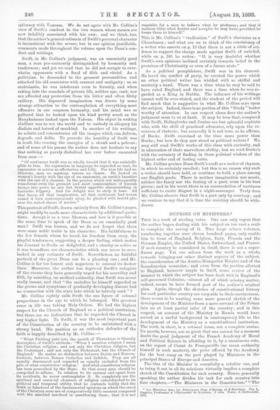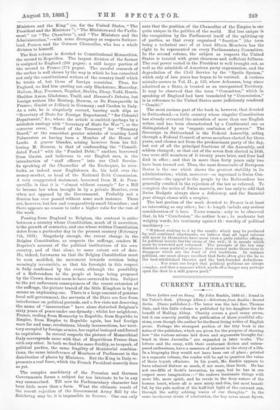DUPRIEZ ON MINISTERS.*
Tins is a work of sterling value. One can only regret that the author began dealing with his subject on too vast a scale to complete the survey of it. Two large octavo volumes, numbering together over eleven hundred pages, only enable him to treat of England, Belgium, Italy, Prussia and the- German Empire, the United States, Switzerland, and France. If each country be considered in itself, there is not a super- fiaous page. Yet one misses from the work as a whole, towards bringing-out other distinct aspects of the subject, the consideration of the Austro-Hungarian Empire and of the Scandinavian countries ; and even from the portion allotted to England, however ample in itself, some review of the manner in which the subject has been dealt with in England's self-governed Colonies,—almost all of which missing matter, indeed, seems to have formed part of the author's original plan. Again, though the sketches of constitutional history for each particular country are very able in their succinctness, there seems to be wanting some more general sketch of the development of the Minister from a mere servant of the Prince into an at least partial ruler of the country ; and in this respect, an account of the Ministry in Russia would have served as a useful background in contemporary life to the development of the Ministry as a constitutional institution. The work, in short, is a colossal torso, not a complete statue. Its merits, however, are so great that one cannot for a moment doubt the good judgment of the French Academy of Moral and Political Science in allotting to it, by a unanimous vote, on the report of Count de Franqucville (no mean authority himself in such matters), the prize offered by the Academy for the best essay on the part played by Ministers in the- principal States of Europe and America.
The idea of the Minister is essentially a relative one, and to bring it out in all its relations virtually implies a complete sketch of the Constitution for each country. Hence, generally speaking, the author divides his task for each country into. four chapters,—" The Ministers in the Constitution," " The
La Madras dans los Principmuo Pays onittrops of d'Airaviqiu). Par L. Lupien, Protossour a l'Universitn do Louvain, 2 vols. Paris : J. Rothschild. DM,
Ministers and the King" (or, for the United States, "The President and the Ministers "), " The Ministers and the Parlia- ment" (or "The Chambers"), and "The Ministers and the A.d.ministration,"—with some divergency as respects Switzer- land, France, and the German Chancellor, who has a whole division to himself.
The first volume is devoted to Constitutional Monarchies, the second to Republics. The largest division of the former is assigned to England (200 pages); a still larger portion of the second to France (274 pages). The careful research of the author is well shown by the way in which he has consulted not only the constitutional writers of the country itself which he treats of, but those of foreign countries. Thus, for England, we find him quoting not only Blackstone, Macaulay, Hallam, May, Freeman, Be gehot, Stubbs, Dicey, Todd, Hearn, Sheldon Amos, Gladstone, Traill, and Hansard's Debates, but foreign writers like Boutmy, Stourm, or De Franqueville in France; Gneist or Jellinck in Germany; and Cardon in Italy. As a rule, he is singularly correct, barring such slips as -"Secretary of State for Foreign Department," "for Colonial Department," &a., where the article is omitted (perhaps by a mistaken analogy with " Secretary of State for War "), or the -converse error, " Board of the Treasury " for " Treasury Board," or the somewhat greater mistake of treating Lord Palmerston as having been a Member of the House of Lords. A graver blunder, arising however from his fol- lowing M. Stourm, is that of confounding the " Consoli- dated Fund" with the "Funded Debt ; " another, borrowed 'from Gneist, and ludicrous to our English ears, is the introduction of "staff officers" into our Civil Service. In speaking of the Chancellor of the Exchequer, he over- looks, as indeed most Englishmen do, his hold over the money-market, as head of the National Debt Commission. A very exaggerated statement, borrowed from M. de Fran- queville, is that it is " almost without example " for a Bill 'to become law when brought in by a private Member, even when not opposed by the Government. Probably not a Session has ever passed without some such instance. These are, however, but few and comparativelysmall blemishes ; and there appears no reason to infer a higher ratio for the rest of the work.
Passing from England to Belgium, the contrast is entire 'between a country whose Constitution, much of it unwritten, is the growth of centuries, and one whose written Constitution dates from a particular day in the present century (February '7th, 1831). Singularly enough, the recent change in the Belgian Constitution, as respects the suffrage, renders M. Dupriezis account of the political institutions of his own country, and of that alone, to some extent out of date. He, indeed, forewarns us that the Belgian Constitution must 'be soon modified, the movement towards revision being seemingly irresistible, so that his foresight in this respect is fully confirmed by the event, although the possibility of a Referendum to the people at large being proposed by the Crown does not seem to have occurred to him. Subject to the yet unforeseen consequences of the recent extension of the suffrage, the picture traced of the little Kingdom is by no means an unpleasing one. There is a large amount of genuine 4ocal self-government, the servants of the State are free from interference on political grounds, and a few riots not deserving the name of " insurrection " have alone disturbed Belgium's eixty years of peace under one dynasty ; whilst her neighbour, France, reeling from Monarchy to Republic, from Republic to Empire, from Empire to Republic again, has had foreign wars far and near, revolutions, bloody insurrections, her terri- tory occupied by foreign armies, her capital besieged and forced to capitulate. In several respects the picture of Monarchical Italy corresponds more with that of Republican France than with any other. In both we find the same fluidity, so to speak, of political parties, the same fragility of Ministerial combina- tions, the same interference of Members of Parliament in the distribution of places by Ministers. But the King in Italy re- presents a real force, which the French President scarcely does as yet.
The complex machinery of the Prussian and German Governments forms a subject far too intricate to be in any way summarised. Till now its Parliamentary character has been little more than a form. What the ultimate result of the recent rejection of the Government Army Bill by the Reichstag may be, it is impossible to foresee. One can only note that the position of the Chancellor of the Vtopire is one quite unique in the politics of the world. Not less unique is the recognition by the Parliament itself of the splitting-up of parties, so that every organised " fraction " (the term being a technical one) of at least fifteen Members has the right to be represented on every Parliamentary Committee. In the second volume, the subject as respects the United States is treated with great clearness and sufficient fullness. The real power vested in the President is well brought out, as well as the mischiefs of American party organisation, and the degradation of the Civil Service by the " Spoils System," which only of late years has begun to be resisted. A curious mistake occurs in Vol. II., p. 123, where Arkansas, long since admitted as a State, is treated as an unorganised Territory. It may be observed that the term " Committee," which in speaking of England had been translated by " Commission," is in reference to the United States more judiciously rendered " Comite."
The most curious part of the book is, however, that devoted to Switzerland,—a little country whose singular Constitution has already attracted the attention of more than one English writer, and has been characterised by a Continental one as distinguished by an "organic confusion of powers." The Sovereign in Switzerland is the Federal Assembly, acting through a Federal Council of seven members elected for three years, and chosen not from the predominant party of the day, but out of all the principal fractions of the Assembly, and seldom changed; so that out of the seven first elected in 1848, two were still members of it twenty years later, and four had died in office ; and that in more than forty years only two have been turned out. Thus, the most democratic of European States is the one which shows the greatest stability in its administration; whilst, moreover—so ingrained is Swiss Con- servatism—the appeal to the people by the Referendum has generally resulted in the rejection of the law so referred. To complete the series of Swiss marvels, one has only to add that Swiss Budgets always show a deficiency, and the financial year always closes with a surplus.
The last portion of the work devoted to France is at least as interesting as any other; but; ;t i length forbids any serious consideration of it here. There remain only to be observed that, in his " Conclusion," the author bear in moderate but weighty words, his testimony against the worship of political machinery :—
" Without wishing to d ny the result3 which may be produced by well combined enactments, we believe that all legal reforms will never by themselves have more than a quite relative efficacy. In political morals lies the cause of the evil ; it is morals which. must be corrected and reformed. The precepts of the law may diminish some particullr abuses ; they cannot make those vices to disappear which are the fruit of evil traditions. In matters political, one must always recollect that facts often give the lie to the best-established theories and the best-founded deductions.
Nor must one forget that political problems are always complex, and that a measure which wards off a danger may perhaps open the door to a still graver peril."



































 Previous page
Previous page